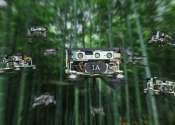Other news
Other
Ukraine war: Why the Russian army is still using morse code more than a century after its invention
Modern warfare is awash with cutting-edge technology—from AI to drones to hypersonic missiles—yet one technology that is more than a century old is still proving its worth: Morse code.
May 16, 2024
0
1
Internet
Q&A: Researcher discusses the importance of visualizing undersea fiber-optic cables
The internet is kind of like drinking water, says UC Berkeley Professor Nicole Starosielski. Most of us don't think much about how it's delivered to our houses or wherever we need it, until we can't get it.
May 9, 2024
0
4

'Everybody is vulnerable': Fake US school audio stokes AI alarm
A fabricated audio clip of a US high school principal prompted a torrent of outrage, leaving him battling allegations of racism and anti-Semitism in a case that has sparked new alarm about AI manipulation.
May 6, 2024
0
22

Stop out-of-control AI and focus on people, new book urges
In a new book co-edited by UdeM's Catherine Régis and Jean-Louis Denis, experts from a dozen countries and a dozen disciplines argue for a more human-centered approach to artificial intelligence.
Mar 28, 2024
0
1

Historic covered bridges are under threat by truck drivers relying on GPS meant for cars
One of Vermont's historic covered bridges has fallen under threat from modern technology.
Mar 20, 2024
0
2
Other
AI is creating fake legal cases and making its way into real courtrooms, with disastrous results
We've seen deepfake, explicit images of celebrities, created by artificial intelligence (AI). AI has also played a hand in creating music, driverless race cars and spreading misinformation, among other things.
Mar 13, 2024
0
3
Other

Renewable energy innovation isn't just good for the climate—it's also good for the economy
As the climate crisis escalates, there are urgent and difficult choices that need to be made to drastically reduce our carbon emissions before more irreparable damage is done.
Feb 27, 2024
0
6
Other

Virtual dissection fleshes out instruction in animal science anatomy lab
In a recent class session devoted to reviewing the components of a monogastric digestive system, Alexandra Else-Keller reminded an animal science student how to position her fingers as they examined how the colon, stomach, ...
Feb 26, 2024
0
24
Other

'Better than a real man': young Chinese women turn to AI boyfriends
Twenty-five-year-old Chinese office worker Tufei says her boyfriend has everything she could ask for in a romantic partner: he's kind, empathetic, and sometimes they talk for hours.
Feb 12, 2024
0
67
Other

Hazard training for mobility scooter users virtually non-existent despite facing regular risks
Despite being vulnerable road users, motorized mobility scooter users receive virtually no training about the types of hazards they face that might put them at risk—from designs of road crossings they find difficult to ...
Feb 9, 2024
0
1
Other

What you should know if you're about to fly on a Boeing Max 9
Boeing 737 Max 9 jetliners are carrying passengers in the United States again for the first time since they were grounded after a panel blew out of the side of one of the planes.
Jan 26, 2024
0
5
Other

Japan literary laureate unashamed about using ChatGPT
The winner of Japan's most prestigious literary award has acknowledged that about "five percent" of her futuristic novel was penned by ChatGPT, saying generative AI had helped unlock her potential.
Jan 18, 2024
0
31
Other

Seeing a lot of mobile speed cameras on your summer road trips? Here's how they work
As you're driving around this summer holidays, there's every chance you'll see a strange-looking white or yellow box on the side of the road.
Dec 27, 2023
0
18
Other

US bans pharmacy Rite Aid from facial recognition use
Pharmacy group Rite Aid was ordered Tuesday to stop using facial recognition for the next five years by a US regulator, which said the company falsely identified consumers as shoplifters using the technology.
Dec 20, 2023
0
3
Other

Best of Last Year: The top Tech Xplore articles of 2023
It was a good year for technology research and development, and nothing made the news more often than energy research efforts. Leading the way were efforts surrounding the use and development of solar energy.
Other

Chinese mourners use AI to digitally resurrect the dead
At a quiet cemetery in eastern China, bereaved father Seakoo Wu pulls out his phone, places it on a gravestone and plays a recording of his son.
Dec 14, 2023
0
25







































